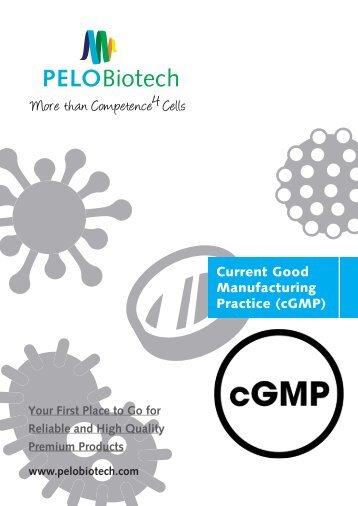PELONews April/May 2019
- Text
- Hydrogel
- Fluorescent
- Pelonews
- Hydrocell
- Pelobiotech
- Primary
PELONews Primary Cells CSO-Talk: Why Isolation and Cultivation of PCs is not always easy by Dr. Lothar Steeb Primary cell culture is the only basis for developing alternative test systems and methods. Theoretically, if one reads the method parts of publications, primary cells can be obtained and cultured quite easily. However, anyone who has already dealt with this topic, the isolation and cultivation of primary cells from human tissues, will quickly notice that there are some challenges that are not mentioned in every methods and that these cells can only show their advantages if they are cultivated differently from permanent cell lines with special microenvironment conditions. An endothelial cell does not grow in an environment for neurons or epithelial cells and vice versa. In addition, the processing of donor tissue must always be based on infectious material, which requires stringent methodological work. Nevertheless, the advantages of primary cells are so great that it is worth working with them. Primary cells are of particular importance with regard to - metabolism - morphology - physiology - Genetic characteristics - demeanor. The most in vivo state is the one closest to the body and therefore form the link CSO: Dr Lothar Steeb between the body and ex vivo cultures. Cross-contaminations and false characterizations can also be excluded. The markers are usually unambiguous. Another disadvantage of cell lines is that they often differ genetically and phenotypically from their original tissue. In contrast, primary cells retain many of the important markers and functions observed in vivo. For example, endothelial cell lines lack various functional markers, while primary endothelial cells retain these important characteristics. In animal cells, in particular, an advantage is extremely important because it enables cross-generational and genetically modified investigations. Many years ago, PELOBiotech was one of the first suppliers of cells that recognised the increasing demands on cell culture media and the cells‘ environment represent an opportunity not only to maintain the individuality of cells, but also to increase the comparability of the results. By creating defined and standardised environmental conditions the results from different working groups are more stringent and also more reliable. They cannot be influenced by unknown factors such as serum components or raw products such as matrices or extracts. With its wide range of products, PELOBiotech offers exactly these opportunities. We are happy to help find the cells you are looking for (there are currently more than a thousand possibilities open to you), the media selection and all the tools you need for optimal primary cell cultivation. PELOBiotech stands for solutions and assistance for all questions regarding primary cell culture and supports in choosing the most efficient, cost-effective and optimized solution from our almost 30,000 products. Want to know more, click on the following links: Animal Cells, Media & Tools: Human cells,Media & Tools
Assays&Arrays WHITE PAPER | Off-Target Toxicity and Linker Stability By Emer Clarke, CSO ReachBio Research Labs CSO Dr. Emer Clarke, PhD The Primary Cell Experts ReachBio Research Labs’ scientists use human primary cells every day in our contract services lab for high value projects for clients in the pharma and biotechnology industries. Their extensive experience in handling and using human primary cells is used in the production of our human cell products, resulting in high quality cells that you can rely on for your own important experiments. We use Cryostor CS5 serum-free cryopreservation medium to ensure high post-thaw viability and overfill each vial to ensure you always get at least the number of cells we advertise on the vial when they are thawed correctly. -> Ask us at PELOBiotech for more. F Antibody drug conjugates (ADCs) combine the benefits of both therapeutic monoclonal antibodies (mAb) and potent small molecule cytotoxic drugs. These moieties are connected through linkers that should be stable within systemic circulation, while maintaining the ability to cleave within the mAb-targeted cells to release highly specific payloads. In addition to the targeted killing of antigen-positive tumor cells, some ADCs appear to have significant off-target effects, causing neutropenia and thrombocytopenia, which have necessitated some clinical trials being terminated early. However, the success of some ADCs in treating diseases has stimulated the continued research of these constructs. ReachBio has two distinct assay platforms to assess cytotoxicity caused by ADCs In the initial platform, they can evaluate off-target toxicity using colony forming cell (CFC) assays to assess effects on erythroid, myeloid, or megakaryocyte progenitors using marrow derived from human, NHP, rat, and mouse. Our second platform addresses linker stability. They have adopted the neutrophil differentiation assay described by Zhao et al (2017), whereby neutrophils cause their own demise by releasing enzymes which cleave the payload from the antibody and thus kill developing neutrophils. Download Emer`s White paper here
- Page 1 and 2: PELONEWS WITH FOCUS ON PRIMARY CELL
- Page 3: Here some impressions of this great
- Page 7 and 8: Reversible Fluorescent Dye for Nucl
Inappropriate
Loading...
Mail this publication
Loading...
Embed
Loading...
About us
This website is published by
PELOBIOTECH Gmbh
Am Klopferspitz 19
82152 Planegg/Martinsried
(Phone): +49 89 517 286 59-0
(Fax): +49 89 517 286 59-88
E-Mail: info@pelobiotech.com
Managing directors:
Dr. Lothar Steeb
Dr. Peter Frost
Registergericht/Trade register:
Amtsgericht München HRB 197203
UID-Nr: DE282095341
EORI-Nr.: DE513247033551940
Responsible for the content (V.i.s.d.M.):
Dr. Peter Frost
Linked Sites: Although we thoroughly check all sites linked to our webpage, we decline any responsibility for their contents.






































Follow Us
Instagram
Email
LinkedIn
Twitter